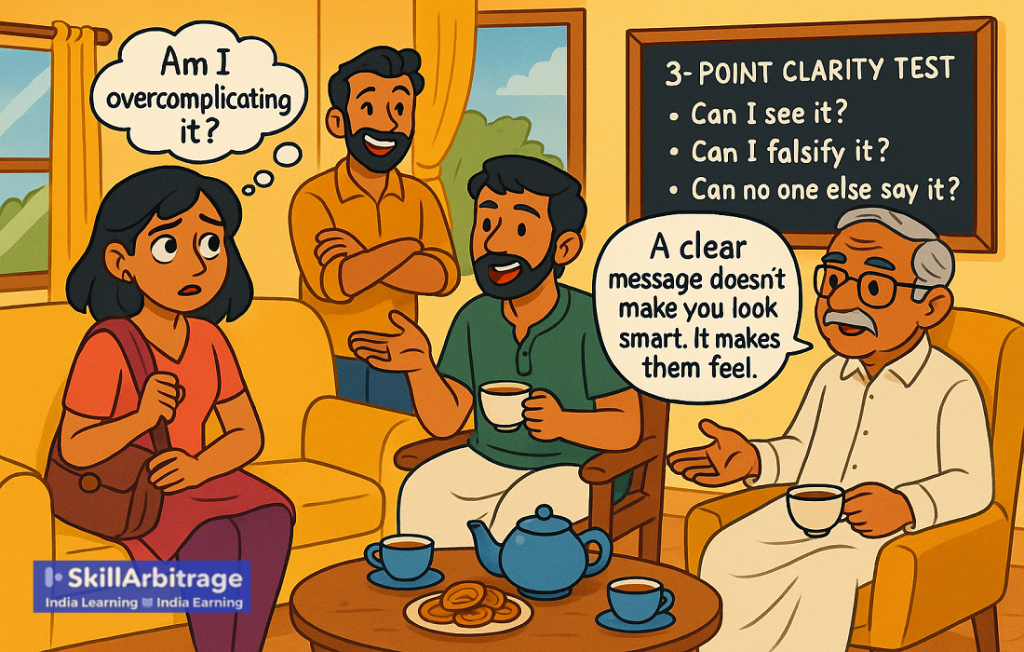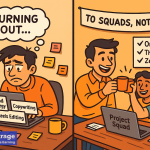This article shows you how to overcome impostor syndrome by harnessing the power of clear, confident writing as a freelancer. You will learn how clarity in your copy makes you stand out as the expert you truly are and helps you win clients, build trust, and feel more confident in your freelance career.
Table of Contents
Previously in X Lists…
Raja showed Savitha how to use X Lists as a lightweight CRM to build meaningful connections with her dream clients without cold DMs or annoying follow-ups.
Now, Savitha meets Parvathishankar, Raghunandan, and Swathi and finds the cure for her impostor syndrome in a surprising place: clear writing.
(Continued…)
The front door creaked open. Raja strolled in like he owned the place, tossing his bag aside and flashing the kind of grin that always meant he was about to say something unnecessary.
“Guess who finally made it? The woman of the hour.”
Savitha stepped in behind him, her shoulders stiff, one hand clinging to her bag like it was life support. Her eyes flicked across the living room… Swathi by the window, Raghunandan on the couch, and Parvathishankar, perched in his usual spot with the newspaper, looking like he’d seen generations pass through that room and judged every one of them.
Swathi stood up with the kind of curious excitement only sisters can fake politely. “I’ve heard so much about you. Raja’s been raving. Now we’ll see if he was lying.”
Savitha let out a nervous laugh. “I hope he didn’t exaggerate too much.”
The warmth in the room was real, but it was also… tight. This was their house. Their rhythm. She was the outsider. Even the cushions looked like they’d known each other longer.
Parvathishankar peered over his glasses. “Ah. Raja’s bringing new blood into the fold. How do you feel, Savitha? Among all this… genius?”
Savitha gave a polite smile, the kind you give when someone might be joking, but you’re not sure.
“I’m just happy to be here.”
Raja leaned against the wall. “They don’t bite. Promise.”
Swathi patted the seat next to her. “Relax. This is family. We’re the ones who should be nervous.”
Savitha sat down gingerly, like the couch might reject her. She tucked her bag beside her feet but kept a hand on the strap.
“So, Raja tells me you’ve started freelancing full-time. How’s that going?” Swathi asked, trying to get Savitha to relax.
“It’s been… good, actually. I’ve got this one client, a SaaS company. They’re doing product analytics for mid-stage startups.”
Swathi’s eyebrows shot up. “SaaS? That’s a huge niche. That’s awesome, Savitha.”
Savitha smiled, then immediately dropped it. “Yeah, I mean, it should be. They sent me the brief. It’s clear. The product’s solid. But… I’m stuck. I haven’t written anything yet. I keep overthinking it.”
Raja jumped in like it was no big deal. “You’re just scared of screwing it up. Happens to everyone.”
But she wasn’t laughing. Her hand moved to her bag again. She wasn’t stuck because of the project. She was stuck because she was scared.
Parvathishankar folded his newspaper slowly. “Stuck, are we? There’s no such thing as writer’s block. That’s just code for indecision. What’s really going on?”
Savitha hesitated. “I’m worried I’ll write the wrong thing. That I’ll mess it up.”
There it was. Said out loud. The fear no one wants to admit when they get their first real client. Not that they’ll fail. That they’ll be found out.
“You’re not frozen because you’re bad at this,” Parvathishankar said calmly. “You’re frozen because you think you have to be clever. The more you try to impress with your words, the less clarity you’ll have.”
“Clever?”
Raghunandan finally looked up. “Clever gets in the way of clarity. You don’t need to be a genius to write. You need to be clear. That’s it. You’re worrying about sounding smart. What you need to do is sound… obvious.”
The room went still for a second. There was no cruelty in it. Just truth.
Raja chimed in. “When I started out, I thought I had to sound perfect. That the writing had to sparkle. But the most persuasive words are the ones that make people understand exactly what you mean. Not admire you.”
“So… Am I overcomplicating it?”
Raja grinned. “That’s an understatement. Welcome to freelancing.”
Savitha let out a slow breath, her shoulders softening. Maybe for the first time since she walked in.
Section 1: Clarity = Precision
Swathi poured everyone chai. The air was looser now, but Savitha still looked like she was trying to solve an equation in her head.
“So,” she said, “if I’m not trying to be clever… am I just supposed to dumb it down?”
Parvathishankar shook his head slowly, like a man who had been waiting years for that question.
“No. You sharpen it.”
What clarity really means
“Clarity isn’t about using small words,” Raghunandan added. “It’s about removing friction. Anything that slows the reader down, like fluff, ego, or overexplaining, kill it.”
Savitha nodded slowly. “So I don’t need to reduce the idea. I need to reduce the resistance.”
“Exactly,” Swathi said. “It’s like handing someone a glass of water, not a Rubik’s cube.”
Parvathishankar sipped his tea. “A clear message doesn’t make you look smart. It makes them feel smart. That’s the trick.”
Precision & simplicity
Raja leaned in. “You ever read something and feel like the writer just plucked the thought from your own brain?”
Savitha smiled. “Yeah. Like they knew exactly what I was thinking.”
“That’s clarity. Not because the idea was small. But because it was precise. Sharp enough to cut through the noise.”
Freelancer move
Clarity is like wiping a foggy mirror.
The message was always there. You’re just letting them see it.
Section 2: 3-point clarity test
Savitha was scribbling like mad, trying to keep up with Parvathishankar’s words.
“Okay, so how do I know if my copy’s clear? Is there a way to test it?”
Raghunandan leaned forward, his usual calm replaced by a hint of seriousness.
“There’s a test I use for every sentence. Three simple questions.”
Savitha’s pen paused mid-air, and she looked up, curious.
1. Can I see it?
She tilted her head. “What do you mean by that?”
“If you can’t visualize it, it’s not real. A good sentence should paint a picture in your mind,” Raghunandan said. “If there’s no image in your head when you read it, then it’s too abstract.”
Savitha jotted it down. Can I see it?
2. Can I falsify it?
“Second question: Can I falsify it?”
Swathi chimed in, “What’s the point of that?”
“Clarity is about truth. If your sentence can’t be proven wrong, then it’s not worth saying,” Raghunandan explained. “A statement has no weight if you can’t challenge it. If you can’t argue against it, no one’s going to believe it.”
Savitha scribbled, her hand moving faster. Can I falsify it?
3. Can no one else say it?
“And the third one?” she asked.
“Can no one else say it?” Parvathishankar replied. “If anyone could’ve written it, then it’s forgettable. Your words have to be distinct—your words, not something anyone else could’ve said.”
Raja smirked, leaning back in his chair. “If it sounds like something out of a textbook, it’s dead on arrival.”
Savitha nodded, her eyes focused on the three questions she’d written down. These were simple, but they felt like the kind of simple that actually meant something.
Freelancer move
When your sentences pass these three tests, you stop blending in and start standing out.
Section 3: Clear writing toolkit
Swathi slid a plate of murukku toward Savitha, then immediately wiped a nonexistent crumb off the table.
Savitha finally let go of her bag and set it on the floor. Not next to her, but down. Her spine still carried some tension, but she no longer looked like she was calculating her exit.
“How do I write clearly?”
“Okay,” she said, brushing a strand of hair behind her ear. “But how do I write clearly?”
Raghunandan looked up, finally engaged. His fingers, until now resting on the rim of his cup, tapped once, then stilled.
1. Write like you talk to a smart friend
“You write like you talk,” he said. “To a smart friend. Not to a crowd. Not to a committee.”
Parvathishankar grunted. “Not to LinkedIn.”
Savitha gave a half-smile. “That’s harder than it sounds. I keep writing things like… ‘unlock your potential’ or ‘deliver world-class results.’ Then I hate myself.”
Swathi burst out laughing. “I’ve seen her do it. She types with confidence and deletes with shame.”
Raghunandan leaned forward, resting his elbows on his knees. “That’s because you’re writing like you’ve seen writing done. Not like you’ve seen people talk.”
He picked up Savitha’s phone from the table, turned it toward her.
2. Avoid phrases you have only seen in marketing decks
“You’d never text me saying, ‘I enable outcome-driven success at scale,’ right?”
Savitha made a face. “God, no.”
“Exactly. Then why do you write like that on your website?”
She opened her mouth, paused, then shrugged. “Because that’s what everyone else is doing?”
“Everyone else is lost,” Raghunandan said. “You want to stand out? Use words from your mouth, not someone else’s deck.”
3. Use real examples instead of vague adjectives
Parvathishankar folded his newspaper again, slower this time, like sharpening a blade. “Examples. Not adjectives.”
Swathi nodded. “Yeah, like don’t say ‘it’s easy.’ Say, ‘you’ll do it in 3 clicks.’”
Savitha was nodding now, absorbing. Her legs had uncrossed. Her hand rested open on the table. She looked less like someone frozen, more like someone learning.
4. Show moments, not metaphors
Raghunandan continued, voice crisp. “Don’t tell me it’s frictionless. Show me. Say, ‘No signup. Just click and go.’”
Savitha smiled. “So… clear writing is showing, not selling.”
5. One sentence = one idea
“It’s considered,” Raghunandan said. “Not casual. It’s clean. Sharply edited. Like a good outfit, it looks effortless but took an hour.”
“Speak for yourself,” Swathi muttered, sipping her chai.
Everyone laughed.
Freelancer move: Clear ≠ Casual
Savitha’s face softened. She leaned back, finally, like the couch had accepted her. “Okay. One sentence, one idea. Punches, not flourishes. Examples over adjectives.”
Section 4: Clarity = Trust
Savitha tapped her nails on the table. Thoughtful, not nervous. “Okay. So clear writing makes it easier to read. But why does that matter so much?”
Parvathishankar didn’t even look up from his paper.
“It’s not just easier to read,” he said. “It’s easier to trust.”
Savitha blinked. “Trust?”
Swathi stepped in, voice steady. “Clients don’t want to be dazzled. They want to be sure.”
Savitha nodded slowly. “So clarity is… a signal?”
1. Clarity signals understanding
Raghunandan answered. “Clarity says, ‘I understand your product. I understand your customer. I know what this copy needs to do.’”
Savitha tilted her head. “And when you don’t write clearly…”
“You signal the opposite,” Swathi said. “That you’re guessing. Or posturing.”
2. Clarity reduces cognitive load
Raghunandan leaned back. “Clear writing lets the reader relax. They’re not working to understand you.”
Savitha’s eyes narrowed, locking in. “So I’m doing the work. Not them.”
Parvathishankar finally folded his paper and set it down. “Confused readers don’t buy.”
3. Confused readers don’t buy
Raghunandan nodded. “If they don’t get it, they won’t trust it. If they don’t trust it, they won’t buy.”
Savitha sat upright again, sharper now. “And if the client doesn’t get what I’ve written…”
“They’ll rewrite it themselves,” Swathi said. “Badly.”
They all laughed.
Except Parvathishankar. He just sipped his filter coffee and muttered, “Or they’ll never hire you again.”
Freelancer Move: Clarity makes clients feel safe
Savitha exhaled through her nose. “Okay. Clear writing isn’t about sounding good. It’s about removing doubt.”
Section 5: How AI sharpens clarity
Savitha frowned at her laptop. “So I tried using AI to rewrite a homepage yesterday…”
Swathi raised an eyebrow. “And?”
“It sounded like a brochure. Like someone wrote it in a Marriott conference room.”
Parvathishankar chuckled. “Most people use AI to get words. Not clarity.”
Savitha looked up. “What should I use it for, then?”
1. AI is best at cleaning, not creating
Raghunandan pulled out his phone. “Give it your messy draft. Ask it to simplify. Cut jargon. Punch up verbs. Break long sentences.”
Swathi added, “Don’t make it write for you. Make it edit with you.”
2. Use AI as your first reader
“Treat AI like a smart-but-literal intern,” Raghunandan said. “Ask: ‘What’s unclear here?’ or ‘What parts confuse you?’ It’ll flag clunky spots faster than your tired brain.”
Savitha smiled. “So I write like me. Then use AI to tighten it like a surgeon.”
Parvathishankar nodded. “Exactly. You’re the writer. It’s the scalpel.”
3. Don’t let AI overwrite your tone
“Just don’t let it strip your voice,” Swathi warned. “If it starts replacing gutsy lines with ‘solutions that unlock scalable growth,’ throw it out.”
Raghunandan grinned. “The minute it starts sounding like LinkedIn, you’ve gone too far.”
Freelancer move: AI is your clarity co-editor
Savitha leaned back, satisfied. “Okay. AI is like spellcheck for clarity. It won’t make my copy good. But it can make it clean.”
Swathi clinked her coffee cup against Savitha’s. “That’s how you use tech without losing your edge.”
Section 6: What about clever ads that win awards?
Savitha scrolled past a moody black-and-white perfume ad. No tagline. No product shot.
She turned to Parvathishankar. “This won awards. It doesn’t even say what it is.”
He didn’t flinch. “Yes. Because it’s not talking to strangers. It’s talking to fans.”
1. Old brands can whisper because you already know the voice
Big brands aren’t explaining themselves. They’re continuing a conversation that started decades ago. You already know what Nike means. You know how a Levi’s ad feels.
They’ve earned the right to be mysterious. You haven’t. Yet.
2. Mystery works only when you’ve built memory
Most of those ads are BOFU — bottom of funnel. Made to remind, not explain. To nudge, not convert.
Freelancers and new brands live at TOFU — top of funnel. You’re still shaking hands.
3. You’re not Nike
When you’re new, you don’t have the luxury of cleverness. You don’t get to hint. You must name. You must show. You must teach. You must earn recall.
Don’t be vague and hope they get it. Be sharp so they can’t miss it.
Freelancer Move: Clarity is how you introduce yourself
Parvathishankar poured his tea. “Levi’s earned the right to whisper. You still have to introduce yourself.”
(To be continued…)







 Allow notifications
Allow notifications
